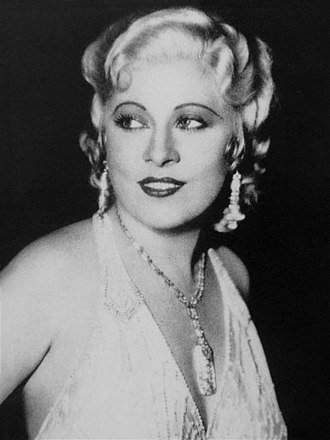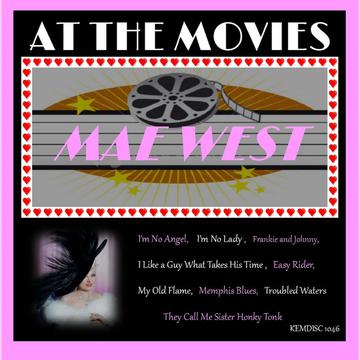
West, Mae
Mary Jane West was born on August 17, 1893, in Brooklyn (either Greenpoint or Bushwick, before New York City was consolidated in 1898). She was delivered at home by an aunt who was a midwife. She was the eldest surviving child of John Patrick West and Mathilde “Tillie” (later Matilda) Delker (originally Doelger; later Americanized to “Delker” or “Dilker”). Tillie and her five siblings emigrated with their parents, Jakob and Christiana (née Brüning) Doelger from Bavaria in 1886.West’s parents married on January 18, 1889, in Brooklyn, to the pleasure of the groom’s parents and the displeasure of the bride’s, and raised their children as Protestants
West’s father was a prizefighter known as “Battlin’ Jack West” who later worked as a “special policeman” and later had his own private investigations agency. Her mother was a former corset and fashion model. Her paternal grandmother, Mary Jane (née Copley), for whom she was named, was a Catholic of Irish descent and West’s paternal grandfather, John Edwin West, was of English–Scots descent and a ship’s rigger.
Her eldest sibling, Katie, died in infancy. Her other siblings were Mildred Katherine West, later known as Beverly, and John Edwin West II (sometimes inaccurately called “John Edwin West, Jr.”). During her childhood, West’s family moved to various parts of Woodhaven, as well as the Williamsburg and Greenpoint neighborhoods of Brooklyn. In Woodhaven, at Neir’s Social Hall (which opened in 1829 and is still extant), West supposedly first performed professionally.
Her first starring role on Broadway was in a 1926 play she entitled Sex, which she wrote, produced, and directed. Although conservative critics panned the show, ticket sales were strong. The production did not go over well with city officials, who had received complaints from some religious groups, and the theater was raided, with West arrested along with the cast.
Between the late 1920s and early 1930s, West continued to write plays, including The Wicked Age, Pleasure Man, and The Constant Sinner. Her productions predictably aroused controversy, which ensured that she stayed in the news and often resulted in packed houses at her performances. Her 1928 play Diamond Lil, a story about a racy, easygoing, and ultimately very smart lady of the 1890s, became a Broadway hit and cemented West’s image in the public’s eye. This show had an enduring popularity and West successfully revived it many times throughout the course of her career.
In June 1932, after signing a two-month contract with Paramount that provided her a weekly salary of $5,000 ($94,800 today), West left New York by train for California. The veteran stage performer was by then nearly 40 years old, an unusually late age to begin a film career, especially for women, although Paramount certainly never had the slightest intention of casting her as an ingénue. She nonetheless managed to keep her age ambiguous for some time. She made her film debut in the role of Maudie Triplett in Night After Night (1932) starring George Raft, who had suggested West for the part. At first she did not like her small supporting role in the drama, but was appeased when she was allowed to rewrite portions of her character’s dialogue. One of several revisions she made is in her first scene in Night After Night, when a hat-check girl exclaims, “Goodness, what beautiful diamonds”, and West replies, “Goodness had nothing to do with it, dearie.” Reflecting on the overall result of her rewritten scenes, Raft is reported to have said, “She stole everything but the cameras.”
For her next role for Paramount, West brought her Diamond Lil character, now renamed “Lady Lou”, to the screen in She Done Him Wrong (1933).The film was one of Cary Grant‘s early major roles, which boosted his career. West claimed she spotted Grant at the studio and insisted that he be cast as the male lead. She claimed to have told a Paramount director, “If he can talk, I’ll take him!” The film was a box office hit and earned an Academy Award nomination for Best Picture. The success of the film saved Paramount from bankruptcy, grossing over $2 million, the equivalent of $140 million today. Paramount recognizes that debt of gratitude today, with a building on the lot named after West.
Her next release, I’m No Angel (1933), teamed her again with Grant. The film was also a box-office hit and was the most successful of her entire screen career. In the months after its release, references to West could be found almost everywhere, from the song lyrics of Cole Porter, to a Works Progress Administration (WPA) mural of San Francisco’s newly built Coit Tower, to She Done Him Right, a Betty Boop cartoon, to “My Dress Hangs There”, a painting by Mexican artist Frida Kahlo. Kahlo’s husband, Diego Rivera, paid his own tribute: “West is the most wonderful machine for living I have ever known—unfortunately on the screen only.” To F. Scott Fitzgerald, West was especially unique: “The only Hollywood actress with both an ironic edge and a comic spark.” As Variety put it, “Mae West’s films have made her the biggest conversation-provoker, free-space grabber, and all-around box office bet in the country. She’s as hot an issue as Hitler.”
By 1933, West was one of the largest box-office draws in the United States and, by 1935, she was also the highest paid woman and the second-highest paid person in the United States (after William Randolph Hearst). Hearst invited West to San Simeon, his massive estate in California, where Hollywood celebrities and prominent political and business figures frequently gathered to socialize. “I could’a married him,” West later commented, “but I got no time for parties. I don’t like those big crowds.” On July 1, 1934, the censorship guidelines of the film industry’s Production Code began to be meticulously enforced. As a result, West’s scripts were subjected to more editing. She, in turn, would often intentionally place extremely risqué lines in her scripts, knowing they would be cut by the censors. She hoped they would then not object as much to her other less suggestive lines. Her next film was Belle of the Nineties (1934). The original title, It Ain’t No Sin, was changed because of censors’ objections. Despite Paramount’s early objections regarding costs, West insisted the studio hire Duke Ellington and his orchestra to accompany her in the film’s musical numbers. Their collaboration was a success; the classic “My Old Flame” (recorded by Duke Ellington) was introduced in this film. Her next film, Goin’ to Town (1935), received mixed reviews, as censorship continued to take its toll by preventing West from including her best lines.
Her following effort, Klondike Annie (1936) dealt, as best it could given the heavy censorship, with religion and hypocrisy. Some critics called the film her magnum opus, but not everyone agreed. Press baron and film mogul William Randolph Hearst, ostensibly offended by an off-handed remark West made about his mistress, Marion Davies, sent a private memo to all his editors stating, “That Mae West picture Klondike Annie is a filthy picture… We should have editorials roasting that picture, Mae West, and Paramount… DO NOT ACCEPT ANY ADVERTISING OF THIS PICTURE.” At one point, Hearst asked aloud, “Isn’t it time Congress did something about the Mae West menace?” Paramount executives felt they had to tone down the West characterization or face further recrimination. “I was the first liberated woman, you know. No guy was going to get the best of me. That’s what I wrote all my scripts about.”
West next starred in Every Day’s a Holiday (1937) for Paramount before their association came to an end. The film performed below its goal. Censorship had made West’s sexually suggestive brand of humor impossible for the studios to distribute. West, along with other stellar performers, was put on a list of actors called “Box Office Poison” by Harry Brandt on behalf of the Independent Theatre Owners Association. Others on the list were Greta Garbo, Joan Crawford, Marlene Dietrich, Fred Astaire, Dolores del Río, Katharine Hepburn and Kay Francis. The attack was published as a paid advertisement in The Hollywood Reporter, and was taken seriously by the fearful studio executives. The association argued that these stars’ high salaries and extreme public popularity did not affect their ticket sales, thus hurt the exhibitors. This did not stop producer David O. Selznick, who next offered West the role of the sage madam Belle Watling, the only woman ever to truly understand Rhett Butler, in Gone with the Wind, after Tallulah Bankhead rejected the role. West also turned down the part, claiming it was too small for an established star and that she would need to rewrite her lines to suit her own persona. The role eventually went to Ona Munson.
West’s next film was Columbia Pictures‘ The Heat’s On (1943). Initially, she did not want to do the film, but after actor, director and friend Gregory Ratoff (producer Max Fabian in All About Eve) pleaded with her and claimed he would go bankrupt if she could not help, West relented as a personal favor. Censors curtailed the sexual burlesque of the West characterization. The studio had orders to raise the neck lines and clean up the double entendres. This was the only film for which West was virtually not allowed to write her own dialogue and, as a result, the film suffered.
Perhaps the most critical, ongoing challenge facing West in her career was censorship of her dialogue. As on Broadway a decade before, by the mid-1930s her risqué and ribald dialogue could no longer be allowed to pass. The Heat’s On opened to poor reviews and weak performance at the box office. West was so distraught after the experience and by her years of struggling with the strict Hays Code censorship office, that she would not attempt another film role for the next quarter-century. Instead, West pursued a successful and record-breaking career in top nightclubs, Las Vegas, nationally in theater and on Broadway, where she was allowed, even welcomed, to be herself.
